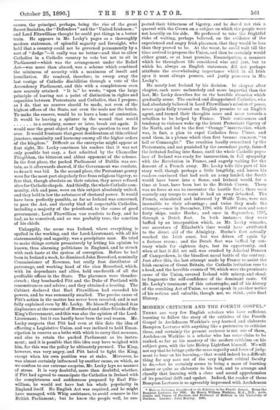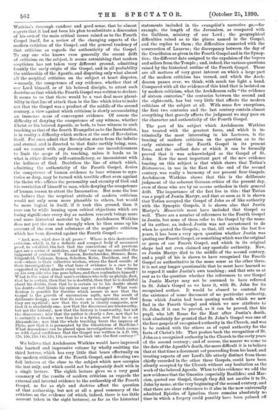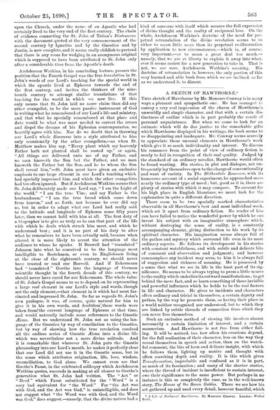MODERN CRITICISM AND THE FOURTH GOSPEL.* THERE are very few
English scholars who have sufficient learning to follow the story of the criticism of the Fourth Gospel in Archdeacon Watkins's very learned and elaborate Bampton Lectures with anything like a pretension to criticise them, and certainly the present reviewer is not one of them, Archdeacon Watkins is a scholar who has some claim to be ranked, so far as his mastery of the modern criticism on his subject goes, with the late Bishop Lightfoot himself. We will not say that he brings quite the same sagacity and force of judg- ment to bear on his learning,—that would indeed be a difficult thing for any man not of the very highest critical faculty to do,—but he certainly seems to bring a mass of learning almost or quite as elaborate to his task, and to arrange and classify that learning with a clear and sound apprehension of its practical drift and upshot. Indeed, the reader of these Bampton Lectures is so agreeably impressed with Archdeacon • Modern Criticism Considered in its Relation to the Fourth Gospel. Being the Bampton Lectures for 1890. By Henry William Watkins, M.A., D.D , arch- deacon and Canon of Durham, and Professor of Hebrew in the University of Durham. London: John Murray. 1890.
Watkins's thorough candour and good sense, that he almost regrets that it had not been his plan to substitute a discussion of his own of the main critical issues raised as to the Fourth Gospel itself, for a review of the changing aspects of the modern criticism of the Gospel, and the general tendency of that criticism as regards the authenticity of the Gospel. To any one who knows even generally the recent drift of criticism on the subject, it seems astonishing that modem scepticism has not taken very different ground, admitting frankly the early origin of the Gospel, and in all probability the authorship of the Apostle, and disputing only what almost all the sceptical criticism on the subject at heart disputes, —namely, the competence of any evidence, whether that of our Lord himself, or of his beloved disciple, to attest such doctrine as that which the Fourth Gospel was written to declare. It seems to us that there would be a vast deal more plausi- bility in that line of attack than in the line which tries to:make out that the Gospel was a product of the middle of the second century, a view against which criticism is slowly accumulating an immense mass of convergent evidence. Of course the difficulty of denying the competence of any witness, whether Christ or his beloved Apostle, or both, to bear witness to such teaching as that of the fourth Evangelist as to the Incarnation, is in reality a difficulty which strikes at the root of Revelation itself. For once admit that Revelation starts from the infinite and eternal, and is directed to that finite earthly being, man, and we cannot with any decency allow our incredulousness to limit the scope of its teaching, unless it lands us in what is either directly self-contradictory, or inconsistent with the holiness of God. Doubtless the line of attack which, admitting the authenticity of the Fourth Gospel, denies the competence of human evidence to bear witness to mys- teries so deep, may be turned with terrible effect even against the theist who affirms the personality and eternity of God and his revelation of himself to man, while denying the competence of human reason to attest the Incarnation. But none the less we believe that the sceptical attitude of modern criticism would not only seem more plausible to others, but would be more logical in itself, if it took this ground, than it ever can be while leaning upon critical objections which are losing significance every day as modern research brings more and more historical material to light. Archdeacon Watkins does not put the case too strongly when he thus sums up his account of the sum and substance of the negative criticism which has been directed against the Fourth Gospel :—
" And, now, what does it all prove ? Where is this destructive criticism, which is, by a definite and compact body of measured proof, to establish the fact that the convictions of all previous ages are a series of mistakes, and that our age has cancelled the judgment of centuries '? Evanson, Bretschneider, Strauss, Baur, Hilgenfeld, Volkmar, Ronan, Scholten, Beim, Davidson, and the rest—where is their collective wisdom, where the fixed results of their investigations ? By what laws of evidence is a case to be supported in which almost every witness contradicts the witness on his own side who has gone before, and then contradicts himself ? What is the value of that man's evidence who tells us plainly, first, that he is certain, then that he is doubtful, then that he is doubtful about his doubts, then that he is certain as to his doubts about his doubts—but thinks his opinion may yet change ? What veri- fication is possible for theories which assure us now that the Gospel is the growth of unconscious myth, now the result of deliberate design ; now that its roots are metaphysical, now that they are mystical ; now that the work is clearly composite, now that it is absolutely one; now that the discourses are trustworthy, but not the history; now that the history is trustworthy, but not the discourses ; now that the author is clearly a Jew, now that he is certainly a Greek ; now that he is a Syrian, now that he is an Alexandrian ; now that the whole teaching bears the impress of Philo, now that it is permeated by the Gnosticism of Basilides ? What dependence can be placed upon investigations which assure us with equal confidence that the Gospel was written in A.D. 180, 170,160,150,140,120,110, or even far back into the first century ? "
We believe that Archdeacon Watkins would have improved this learned and impressive volume by wholly omitting the third lecture, which has very little that bears effectually on the modem criticism of the Fourth Gospel, and devoting two full lectures at the close to the subject which now occupies the last only, and which could not be adequately dealt with in a single lecture. The eighth lecture gives us a very good summary of the results of modern criticism as regards the external and internal evidence to the authorship of the Fourth Gospel, so far as style and doctrine affect the question of that authorship, but not at all a good summary of the criticism on the evidence (of which, indeed, there is too little account taken in the eight lectures), so far as the historical statements included in the evangelist's narrative go,—for example, the length of the Jerusalem, as compared with the Galilean, ministry of our Lord ; the geographical difficulties raised as to the places named in the Gospel, and the replies to them ; the difficulties connected with the resurrection of Lazarus ; the discrepancy between the day of the Crucifixion as given in the Fourth Gospel and in the Synop- tics ; the different date assigned to the expulsion of the buyers and sellers from the Temple ; and, indeed, the various questions raised by the historical outline of the Fourth Gospel. These are all matters of very great interest on which a large part of the modern criticism has turned, and which the Arch- deacon passes over, we think, with much too light a hand. Compared with all the evidence of this kind that is insisted on by modern criticism, what the Archdeacon calls " the evidence of sixteen centuries," the centuries between the second and the eighteenth, has but very little that affects the modern criticism of the subject at all. With some few exceptions, the first two centuries and the last century contain almost everything that gravely affects the judgment we may pass on the character and authenticity of the Fourth Gospel.
The part of his subject which Archdeacon Watkins has treated with the greatest force, and which is in- trinsically the most interesting in his Lectures, is the bearing of modern criticism on the question as to the early existence of the Fourth Gospel in its present form, and the earliest date at which it can be formally proved that it was acknowledged as the Gospel of St. John. Now the most important part of the new evidence bearing on this subject is that which shows that Tatian's Diatesseron, in use in the East at the end of the second century, was really a harmony of our present four Gospels. Archdeacon Watkins shows that this is the deliberate judgment of the soberest German critics of the present day, even of those who are by no means orthodox in their general drift. The importance of the fact lies in this : that Tatian was a pupil of Justin Martyr, and that so soon as it is shown that Tatian accepted the Gospel of John as of like authority with the Synoptic Gospels, it is shown also that Justin Martyr's Memorials must have included that Gospel as well. There are a number of references to the Fourth Gospel in Justin, but none of them refer to the Gospel by the name of its author, as, indeed, Justin was not accustomed to do when he quoted the Gospels ; so that, till within the last few years, it has been a very open question whether Justin was quoting our Fourth Gospel, or something which was the original or germ of our Fourth Gospel, and which in its original shape had not even claimed any apostolic authority. Now, as Justin Martyr died in the middle of the second century, and a pupil of his is shown to have recognised the Fourth Gospel as authoritative in the same sense as the other three, it is not any longer questionable that he must have learned so to regard it under Justin's own teaching ; and that sets us at rest as to the question whether the references to our Gospel in Justin Martyr may not be assumed to have referred to St. John's Gospel as we have it, with St. John for its recognised author. It would be absurd to contend for the existence of some document of no particular authority, from which Justin had been quoting words which we now find in the Fourth Gospel and which we now attribute to St. John, if it can be proved, as it can be proved, that his pupil, who left Rome for the East after Justin's death, took absolutely for granted that St. John's Gospel was one of the four gospels of recognised authority in the Church, and was to be ranked with the others as of equal authority for the facts of Christ's life. That pushes back the recognition of St. John as a recognised authority in the Church to the early years of the second century ; and of course, the nearer we come to the date of the Apostle's death, the more difficult it is to believe that at that time a document not proceeding from his hand, and treating aspects of our Lord's life utterly distinct from those chiefly recorded in the other three Gospels, could have been silently accepted by the Church without any hesitation as the work of the beloved Apostle. When to this evidence we add the new evidence that the Gnostics (especially Basilides) and Mar- cion, quoted our Gospel, though they did not ascribe it to St.. John by name, at the very beginning of the second century, and that there are clear references to it also in the now universally admitted Epistles of Ignatius, there remains absolutely no time in which a forgery could possibly have been palmed off upon the Church, under the name of an Apostle who had certainly lived to the very end of the first century. The chain of evidence connecting the St. John of Tatian's Diatesseron with the document quoted at the very commencement of the second century by Ignatius and by the Gnostics and by Justin, is now complete, and it seems really childish to pretend that there is any room for wedging in an anonymous original which is supposed to have been attributed to St. John only after a considerable time from the Apostle's death.
Archdeacon Watkins, in his concluding lecture, presses the position that the Fourth Gospel was the free translation in St. John's words of our Lord's teaching for the special world in which the apostle lived at Ephesus towards the end of the first century, and invites the thinkers of the nine- teenth century to attempt similar translations of that teaching for the world in which we now live. If this only means that St. John laid no more claim than did any other evangelist, to be the mere passive instrument of God in writing what he remembered of our Lord's life and ministry, and that what he specially remembered at that place and date would be what was most needed to correct the errors and dispel the dreams of his Ephesian contemporaries, we heartily agree with him. Nor do we doubt that in throwing our Lord's whole discourse into a style attributed to him only occasionally by the other evangelists,—as when St. Matthew makes him say, "Every plant which my heavenly Father hath not planted shall be rooted up," or again, "All things are delivered unto me of my Father, and no man knoweth the Son but the Father, and no man knoweth the Father but the Son, and he to whom the Son shall reveal him,"—St. John must have given an exclusive emphasis to one large element in our Lord's teaching which had specially impressed him, and which the other evangelists had too often ignored. But if Archdeacon Watkins means that St. John deliberately made our Lord say, " I am the Light of the world," " I am the true Vine, and my Father is the husbandman," " I am the true bread which came down from heaven," and so forth, not because he ever did say so, but in order to adapt what our Lord had really said to the latitude and longitude of Ephesus some fifty years later, then we cannot hold with him at all. The first duty of a biographer is to give as truly as he can that part of the life with which he deals which struck him most, and which he understood best ; and it is no part of his duty to alter what he remembers to have been actually said, because when altered it is more likely to arrest the attention of the audience to whom he speaks. If Boswell had " translated " Johnson into what he conceived to be the language most intelligible to Scotchmen, or even to Englishmen living at the close of the eighteenth century, we should never have trusted or read our Boswell. And if Eckermann had " translated " Goethe into the language of German scientific thought in the fourth decade of this century, we should never have cared for our Eckermann. The whole value of St. John's Gospel seems to us to depend on its representing a large real element in our Lord's style and words, though not the only element, —that element in it which had most fas- cinated and impressed St. John. So far as regards St. John's own prologue, it was, of course, quite natural for him to give it in his own words, and doubtless, these words were taken from the current language of Ephesus at that time, and would naturally include some references to the Gnostic .lons. But we understand St. John not as using the lan- guage of the Gnostics by way of conciliation to the Gnostics, but by way of showing how the true revelation resolved all the endless series of Gnostic .zEons into a divine life which was nevertheless not a mere divine solitude. And it is remarkable that wherever St. John puts the Gnostic phraseology into our Lord's mouth, lie makes it perfectly clear that our Lord did not use it in the Gnostic sense, but in the sense which attributes origination, life, love, wisdom, reconciliation, to God alone. We cannot even see that Goethe's Faust, in the celebrated soliloquy which Archdeacon Watkins quotes, succeeds in making at all clearer to Goethe's generation what St. John had written. The " Act " or " Deed " which Faust substituted for the " Word " is a very bad equivalent for " the Word." For " the Act was with God, and the Act was God," is unintelligible, and does not suggest what " the Word was with God, and the Word was God," does suggest,—namely, that the divine nature had a kind of converse with itself which secures the full expression of divine thought and the reality of reciprocal love. On the whole, Archdeacon Watkins's doctrine of the need for per- petual retranslation of the divine revelation seems to us either to mean little more than its perpetual re-illustration by application to new circumstances,—which is, of course, very important, —or to mean a great deal too much,— namely, that we are at liberty to explain it away into what- ever it seems easiest for a new generation to take in. That is not, we are sure, Archdeacon Watkins's meaning. His doctrine of retranalation is, however, the only portion of this very learned and able book from which we are inclined, so far as we understand it, to dissent.








































 Previous page
Previous page